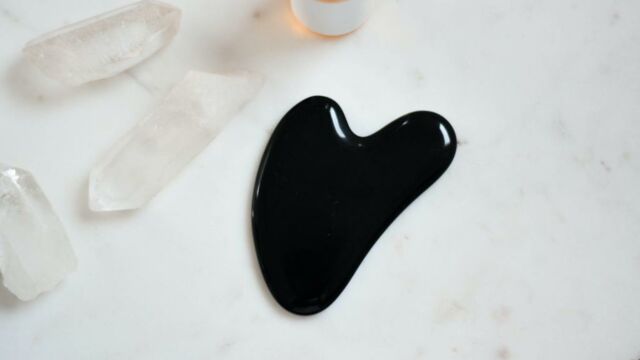How to use gua sha tools in your skincare routine

Gua Sha stones have been making a comeback in our skincare routines, but there’s much more to these tools than a facial massage.
Jade rollers have had their moment, but now a new skincare tool is heading the spotlight: Gua Sha stones. These smooth, hand-held pebbles have been revered for their abilities to chisel cheekbones, de-puff under eyes and brighten the skin. But, how can this simple stone offer so many benefits? The answer is all in the technique.
Discover our latest podcast
What is gua sha?
Despite its recent popularity, gua sha is actually a time-tested Chinese stone scraping treatment that dates back centuries. These rounded, architectural stones were originally scraped against the skin to ward off inflammation and chronic pain but have since been discovered to have incredible benefits when it comes to skincare.
More under this adMore under this adBenefits of gua sha
When used on the skin, gua sha treatments have the ability to:
- Stimulate blood flow
- Relax muscles
- Aid in lymphatic drainage
- Boost collagen production
- Decrease puffiness
- Decrease inflammation
- Decrease dark circles
- Brighten facial complexion
- Sculpt facial muscles
How to use gua sha in your skincare routine
With all these benefits, we wouldn’t be surprised if you’ve already got your gua sha stone armed and ready to go. But, before you begin your skin scraping journey, you might want to learn some of the basic techniques.
While there isn’t a one-size-fits-all approach to gua sha, there are a few fundamentals that will ensure you get the best results.
More under this adMore under this adNever forget to lube up the skin
Firstly, apply moisturiser or facial oil before going in with your gua sha. This layer of lubrication will help reduce drag on the skin.
Pressure and direction are key
When using your gua sha tool, apply consistent and gentle pressure moving away from the face to aid in lymphatic drainage.
More under this adMore under this ad1. Forehead
To use your gua sha stone on your forehead, place your supporting hand over your eye and use the flat side of the gua sha tool to gently scrape vertically from the eyebrow to the hairline. Give a little wiggle at the end to help lymphatic drainage and repeat across the forehead.
2. Eyebrows
Using a gua sha stone over your eyebrows is a great way to reduce sinus pressure. If you have a heart-shaped edge to your gua sha, use this side to scrape outwards from the top of the nose to the temple. Again, wiggle your tool at the end for an extra massage and drain boost lymphatic drainage.
More under this adMore under this ad3. Under eyes
If you’re looking to de-puff your under eyes and reduce dark circles, you’ll want to take the curved edges of your gua sha stone and scrape outwards from underneath the eye-line to the temple.
4. Cheekbones
To highlight and define the cheekbones, use the flat side of your gua sha or the heart-shaped edge, and follow your cheekbones outwards to the top of the ears.
More under this adMore under this ad5. Jawline
To chisel out that jawline, take the contoured side of your gua sha stone and align it with the centre of your chin. Then, using even pressure, slide your gua sha outwards along the jawline. Give it a little wiggle at the end, then repeat on the other side.
6. Neck
Using your gua sha stone along the side of your neck can help loosen up any tight muscles. Just use the flat side of your tool, take it from the collarbone, and rub it upwards towards the bottom of the ear.
More under this adMore under this adHow often should you use your gua sha?
Gua sha isn’t invasive or irritating when used correctly and can even be incorporated into your everyday routine. Giving yourself some time with your gua sha stone each morning is a fantastic way to reduce that post-sleep puffiness and wake up the blood flow for the day.
Don’t forget to clean your gua sha
Last but most importantly, don’t forget to wash your gua sha stone with your facial cleanser and some warm water after each use. These tools are often made from porous materials such as jade or rose quartz which can harbour bacteria. Then, make sure your stone is bone dry before storing it away.
More under this ad